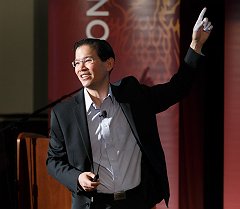Invited Talk: Resource-Efficient Quantum Computing by Breaking Abstractions
Quantum computing is at an inflection point, where 53-qubit (quantum bit) machines are deployed, 100-qubit machines are just around the corner, and even 1000-qubit machines are perhaps only a few years away. These machines have the potential to fundamentally change our concept of what is computable and demonstrate practical applications in areas such as quantum chemistry, optimization, and quantum simulation.
Yet a significant resource gap remains between practical quantum algorithms and real machines. A promising approach to closing this gap is to selectively expose to programming languages and compilers some of the key physical properties of emerging quantum technologies. I will describe some of our recent work that focuses on compilation techniques that break traditional abstractions, including compiling directly to analog control pulses, compiling for machine variations, and compiling with ternary quantum bits. I will also describe other important verification challenges to be solved on the road to practical quantum computing.
| Slides (Chong-QC-PLanQC20.pdf) | 5.67MiB |
Fred Chong is the Seymour Goodman Professor in the Department of Computer Science at the University of Chicago. He is also Lead Principal Investigator for the EPiQC Project (Enabling Practical-scale Quantum Computing), an NSF Expedition in Computing. Chong received his Ph.D. from MIT in 1996 and was a faculty member and Chancellor’s fellow at UC Davis from 1997-2005. He was also a Professor of Computer Science, Director of Computer Engineering, and Director of the Greenscale Center for Energy-Efficient Computing at UCSB from 2005-2015. He is a recipient of the NSF CAREER award, the Intel Outstanding Researcher Award, and 6 best paper awards. His research interests include emerging technologies for computing, quantum computing, multicore and embedded architectures, computer security, and sustainable computing. Prof. Chong has been funded by NSF, DOE, Intel, Google, AFOSR, IARPA, DARPA, Mitsubishi, Altera and Xilinx. He has led or co-led over $40M in awarded research, and been co-PI on an additional $38M.
Sun 19 JanDisplayed time zone: Saskatchewan, Central America change
10:30 - 12:30 | |||
10:30 30mTalk | Invited Talk: Q# - Going Beyond Quantum Circuits PLanQC Media Attached | ||
11:00 30mTalk | Invited Talk: Resource-Efficient Quantum Computing by Breaking Abstractions PLanQC Media Attached File Attached | ||
11:30 20mTalk | Tuning up entanglement through the cloud using Qiskit-OpenPulse PLanQC Thomas Alexander IBM T.J. Watson Research Center, New York, USA, Naoki Kanazawa IBM Research, Tokyo, Japan, Daniel Egger IBM Research, Zurich, Switzerland, Ali Javadi-Abhari IBM T.J. Watson Research Center, New York, USA, David C. McKay IBM T.J. Watson Research Center, New York, USA | ||
11:50 20mTalk | Tracking Errors through Types in Quantum Programs PLanQC Kesha Hietala University of Maryland, Robert Rand University of Maryland, Michael Hicks University of Maryland Pre-print Media Attached File Attached | ||
12:10 20mTalk | Quantum CPOs PLanQC | ||
